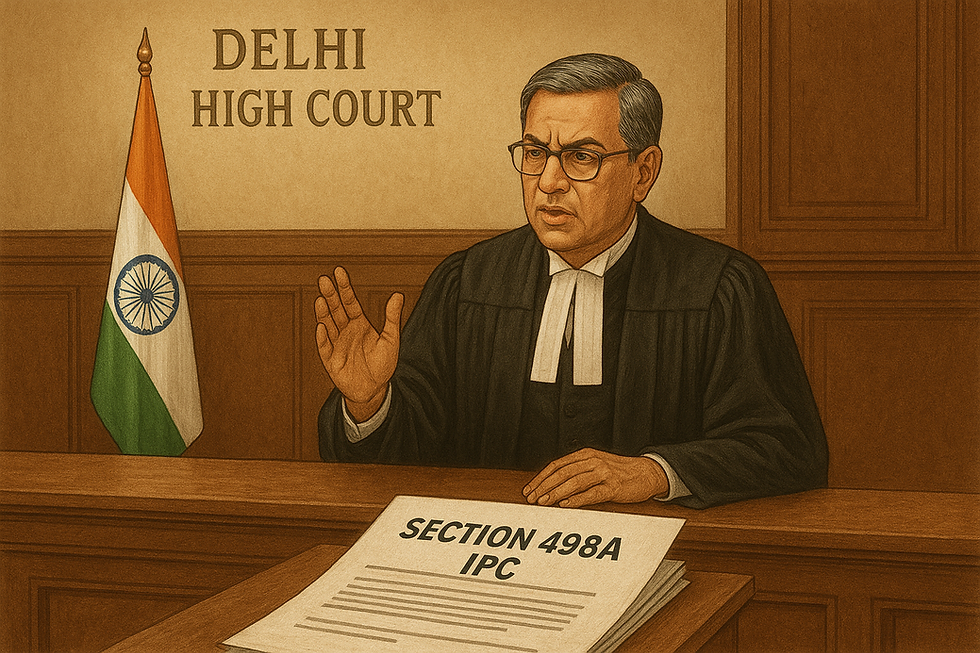Delhi Court: Invalidated Marriage Doesn’t Preclude Application of Section 498A IPC
- Lawttorney.ai

- Nov 7, 2025
- 3 min read
Case Name: Om Saran Gupta v. State of NCT of Delhi
Introduction:
The Delhi High Court presently pronounced an important ruling regarding the application of Section 498A of the Indian Penal Code, 1860. The court directed that the provision, which penalises cruelty by a husband or his relatives toward a married woman, remains relevant even if the marriage is later voided.

Background of the Case:
A petition has been registered according to Section 482 of the Criminal Procedure Code (CrPC) by Om Saran Gupta, Siddharth Gupta @ Lohia, and Ashish Gupta, and the petition seeks to quash an FIR under Sections 498A (cruelty by husband/relatives), 406 (criminal breach of trust), and 34 (common intention) of the IPC. The application also questions the charge sheet and the summons, together with all Legal actions arising from them.
Out of the three petitioners, two accused were Previously acquitted from the case by the Mahila Court. Hence, the current petition is mainly related to Om Saran Gupta.
Legal Provision:
498A of the IPC: Criminalises cruelty by a husband or his relatives towards a woman, punishable by up to three years in prison and a fine. This law, intended to protect women from dowry-related harassment and cruelty, is a cognizable and non-bailable offence.
406 of IPC: Section 406 of the Indian Penal Code (IPC) provides the punishment for the offence of criminal breach of trust, which involves dishonestly misappropriating or converting property that was entrusted to an individual.
34 of IPC: Section 34 of the Indian Penal Code (IPC) deals with joint liability and holds that when a criminal act is committed by several people in furtherance of a common intention, each person is equally liable for the act as if they had committed it alone.
Delhi High Court Insights on Application of Section 498A:
Justice Krishna referred to the Supreme Court’s decision in Reema Aggarwal v. Anupam, wherein it was held that even though the term “husband” is not Expressly defined, it comprises persons who enter a marriage ostensibly and cohabit with a woman while assuming the role and status of a husband. The court directed that the invalidity of such a relationship does not preclude such persons from the scope of Section 498A of the Indian Penal Code.
The Court observed that at the time, the marriage had not yet been legally annulled; it was only annulled on 05.05.2022. Hence, the Petitioner could not escape responsibility under Section 498A of the IPC on that basis.
However, the Court ruled to set aside the FIR and chargesheet because there was no evidence, no initial evidence, showing cruelty or harassment by the Petitioner.
The judge explained that the claims were vague, general, and broad, depending mainly on unsupported claims and threats without any dates or details.
The Court Concluded that,
“Thus, the essential ingredients of Section 498A IPC are not made out from the Complaint made by Respondent No. 2. The entire complaint and the evidence collected during the investigations in the present matter, even if admitted in toto, would not be enough to prove an offence under Section 498A IPC.
Way Forward:
According to the Court, there was not even the slightest indication that the Petitioner had harassed or mistreated the complainant. As a result, it decided that carrying on with the prosecution would be an abuse of the court system. The case against the Petitioner was thus dismissed on the grounds that the FIR and the charge sheet were set aside.
Empower Your Legal Practice with AI – Join Our Free Webinar!
Are you a legal professional looking to boost your efficiency and stay ahead in a competitive field? Discover the power of Lawttorney.AI – the cutting-edge tool designed to streamline legal research, automate tasks, and enhance productivity.
👉 Don't miss out! Reserve your spot in our FREE webinar and experience the future of legal practice today. Register Now




Comments